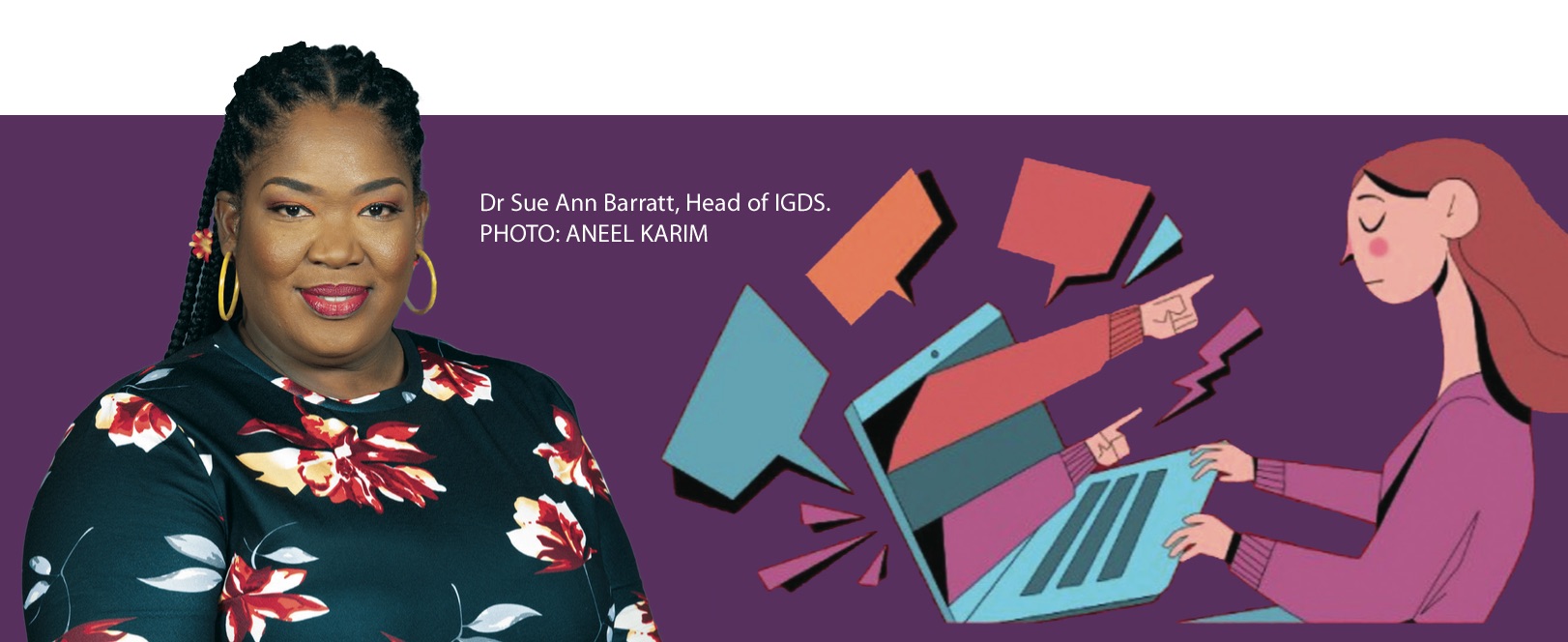
IGDS Head Dr Sue Ann Barratt views International Women’s Day as a timely reminder that work still needs to be done
As the world commemorated its 114th International Women’s Day (IWD) on March 8, local gender activists took to the streets of Port-of -Spain to call on society to make progress on issues affecting women during the UWI St Augustine Institute for Gender and Development Studies’ (IGDS’) annual IWD Rights Rally and March held in collaboration with the Women’s Rights Alliance.
With issues such as climate change, gender-based violence, leadership, and access to proper healthcare services being some of the most pressing issues affecting women, IDGS Head Dr Sue Ann Barratt is reminding people that there is work to be done.
While IWD activities around the world have taken on a more celebratory tone over the years, Barratt said that it is crucial to ensure that local commemorations remain rooted in advocacy.
She explained, “It’s a time to reflect on a range of issues that may have emerged since the last International Women’s Day, or issues that are sustained over time.
“We go out and march because we want to ensure there is visibility for the issues and assert strong calls for transformative change.
“International Women’s Day has also been a fixture for UWI and IDGS as a moment where we assert commitments, advocacy, and representation for, by, and on behalf of women and girls, in collaboration with allied men and boys.”
With this year’s IWD themed “Inspire Inclusion,” Barratt said it's an answer to the “pushback” that the women’s rights movement has received.
She explained that, in some cases, people believe “it’s a threat that women and other traditionally subordinated groups are making gains.”
Barratt said the surge of “extreme” views online and in podcasts related to women are examples of how the pushback against gender justice has manifested itself locally, regionally, and internationally.
“We’ve made gains in areas where people are more conscious about the inclusion and empowerment of women,” said Dr Barratt. “But then, on the other side, people are asserting jokes or dismissals of the trends that signal women’s empowerment.
“There are a lot of people who are not in favour of progress because they think to include means to exclude them, but the purpose of inclusion is adding more.”
With these pockets of resistance manifesting itself as violent language and sexual harassment in online spaces, Barratt said it is important to take action to counteract extremist views online.
While many may not make the connection, Barratt said extremism in online spaces can manifest itself into gender-based violence and femicide, an issue Trinidad and Tobago is already grappling with.
“We have made strides for women and girls, in collaboration with so many players across academia, corporate, the state, civil society organisations, and faith-based organisations,” she said. “However, we confront persistent vulnerabilities, intense backlash – both in the online and offline – and states are in conflict across the globe that put women’s rights in a troubling space.”
At the IGDS, Barratt highlighted efforts which include research on child-sexual abuse, child marriages, and social and behavioural change to end gender-based violence.
Further research efforts include gender and climate justice, sexuality, and the intersection of gender and food systems, in collaboration with the Faculty of Food and Agriculture.
“Regionally, we have updated the UWI Gender Policy which is now going through the different levels of approval,” she said. “We strive to work collaboratively with different faculties and departments to advance our research and action.”
Barratt noted that comprehensive data and information will contribute to the development of effective policies and actions.
To date, representatives from the IGDS and other gender stakeholders have been able to intervene on local policies and legislation. Personally, Dr Barratt has been involved in the development of the National Action Plan as part of the UN’s Women, Peace, and Security Resolution 1325.
But IGDS Head is also reminding people that change begins at home and in their local communities.
“We also see young people taking action for themselves and asserting their perspectives on issues,” Barratt said. “In The UWI space, we have the IDGS Ignite, where students have been vibrant, and we also see the inclusion of a gender advisor on The UWI St Augustine Guild of Students, which is so important.”
Barratt’s vision for women is that their existence, presence, and contributions are not seen as an exception, but rather a way of life, which would indicate true inclusion.
“Women’s contributions need to be inherently valued and not pointed out after the fact to be appreciated,” she stated.
She is hopeful that there will continue to be a reduction in gender-based violence and collaborative work with men, boys, and gender non-conforming individuals, to contribute to this.
Dr Barratt calls on influencers, the media, the state, faith-based organisations, and civil society organisations to continue to work together to address gender-based violence.
“Women are not a homogenous group. So when we speak of gains for women, we also need to be cognisant of the fact that not all women enjoy those gains, and we must work to ensure all segments are empowered,” she said.
“Therefore, women and girls’ ways of being, realities, vulnerabilities, considerations, decisions, and so forth, must be included as part of what is standard ways of being human rather than being an exception,” Dr Barratt concluded.